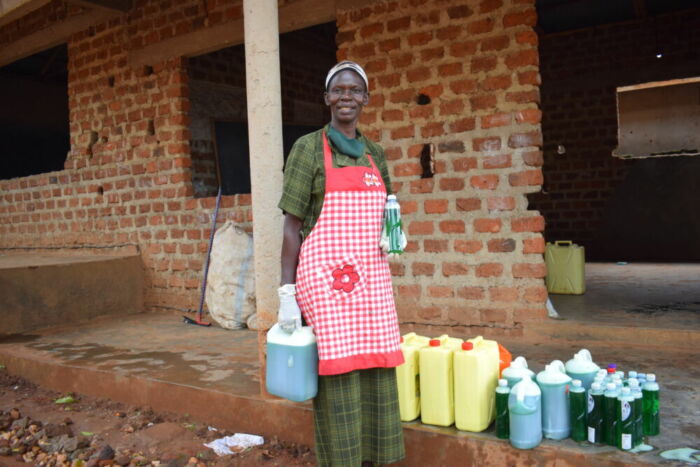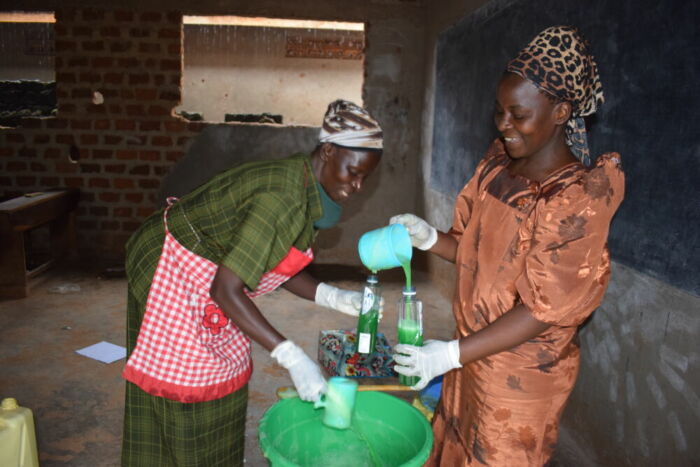These preventive measures have hurt many businesses and workers who work in small and medium enterprises. In Uganda, the country has witnessed job cuts across various sectors, reducing business income and reducing working hours for the available staff.
One of the people affected by the massive job losses is Alice Nakyejwe, a Ttula Housing Cooperative Society member. Before the lockdown, she was a school matron at Mbogo Senior Secondary School located in Kawempe Division, Kampala District.

“When schools closed because of the Corona pandemic, I found myself without enough resources to cater to my children since this was my sole income source,” says Alice.
Towards the countrywide lockdown, there were many urban to rural migration. People left for their villages to avoid financial hardship brought about by the Coronavirus pandemic. Many people left the capital, citing the pandemic, which had subjected them to poverty and unemployment. “Little did I know that this would be my reality as a single mother of three children with no job to put food on the table for my family’’ Alice Laments.

Alice listened keenly to recommended preventive measures for the disease being relayed through the various media outlets. The Ministry of Health provided 34 measures to control the spread of the COVID-19. The measures included; maintaining hygiene through ways like regular hand washing hands with soap and water or using alcohol-based sanitisers, among many others.
All measures emphasized the importance of frequent handwashing with soap and water to prevent the disease from spreading. Not one to miss an opportunity to make a difference in people’s lives, Uganda Housing Cooperative Union (UHOCU) began training members on liquid soap production. In addition, they set up tippy taps for members in their homes and supported them to embrace the recommended hygiene practices.
The housing cooperative organized hands-on training in liquid soap production where five housing cooperatives, namely, Kawempe Ttula, Makindye Galima, Our Lady of Charity MulagoIII, Mulago Mamapapa and Banda Bisoboka, participated.

Alice Nakyejwe, a 57-year-old Kawempe Ttula Housing Cooperative member, narrates how the training provided her with the skills to set up an alternative income source.
“I was among the few trainees selected on behalf of Kawempe Ttula to attend the training aimed at containing the spread of COVID-19 at Uganda Housing Cooperative Union (UHOCU).
UHOCU trained us in soap making. As a result, I have decided to use those skills to make soap that is desperately needed now to fight the COVID-19 and earn an income as well,” Alice made good use of the skills acquired during training to launch a small liquid soap production business.

She established the business with a loan of UGX100,000 (291 Sek) from the Village Savings and Loans Association (VSLA), where she is a member. She went ahead to buy raw materials worth UGX32,000 (99 Sek) and other ingredients at UGX68,000(198 Sek) enough to produce 200litres. She started with 20litres, which sold at UGX52,500 (153Sek).
“Today, I produce 60litres per week and sell to fellow members in the housing cooperative and community. My weekly sales range between UGX85,000 (248 Sek) and UGX105,000(306 Sek),” Alice remarks happily.
All these sales are under the Kawempe Ttula Housing (KTH) multipurpose liquid soap brand name. The demand for the commodity has also increased as more people appreciate the role of soap and water in COVID-19 prevention. It has also made it possible for women to make a difference in the community whilst generating income to sustain their livelihoods.
Women like Alice have been empowered into leadership roles through the support of We Effect and Uganda Housing Cooperative Union (UHOCU). “I was given the position of a Supervisory Committee secretary and project manager. The opportunity came because of the hands-on training I attended on behalf of my Primary Housing Cooperative Society in liquid soap production and setting up of tippy taps.”
“As a woman, I never thought I could one day have a business with my name. But through the training and mentorship of We Effect, I am now a business owner and changing the lives of my family and community.”
